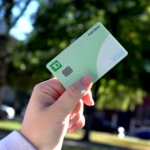Banks are wooing students with credit card offers — but is this financial independence or a debt trap?
Credit card companies know where to find their next customers: college campuses. For many students, the first offers come wrapped in glossy promotions that promise convenience, perks and financial freedom. But, behind the shiny marketing lies uncertainty and, often, confusion. “I’ve definitely been offered credit cards,” one student said. “At first, they seemed like great deals, but once I looked closer, they weren’t. Thankfully, my mom stepped in and helped me find a better option, because I honestly didn’t understand much about it at the time.”
For many, the first credit card isn’t just about convenience –– it’s about building something bigger. “I was motivated because I wanted to be able to build credit,” the same student explained. “It was also helpful to have some kind of support until I could pay off my bills.”
That sense of independence came with a catch. “It really helps because it makes you hold yourself responsible,” they said. “But if you’re not keeping yourself on track with the bills, you could easily turn it into a bad thing.”
For one student, the challenges became clear during a particularly overwhelming semester. “I ended up falling behind when multiple bills piled up at once,” they recalled. “Suddenly, school didn’t feel like my biggest problem anymore. It was stressful and nerve-wracking, but eventually I managed to catch up and get things under control.”
Still, the experience left them wishing schools did more to prepare students. “We don’t have classes in high school or anywhere to help us understand things like the pros of opening a TFSA or a credit card,” they said. Their advice to other students? “Be careful and see what kind of credit cards align with your needs. And make sure to make the monthly payments on time.”
Another student had a different take: that upbringing plays a major role in whether credit cards help or harm. “Depending on the way you were raised, I think it makes a difference,” they explained. “If you’re raised in a way where your family is always telling you to just put things on your card when you can’t afford them, or you see your card as extra money, then yeah, it could lead to a lot of debt. But if you were taught about credit scores, when to pay it off, and reminded not to overdo it, then I think it could help you build financial stability and responsibility.”
That split between opportunity and risk –– is exactly what financial experts are concerned about. “The biggest risk associated with students being targeted by credit card offers is that they can get into debt if they don’t use their cards appropriately,” one expert told me. “It can seem like a very good option at first, especially when you’re going to university or transitioning from high school. Your spending increases at that point. But in the long run, you need to be careful with how you spend your money, even if it’s a credit card and not a debit or cash.”
The expert acknowledged that credit cards can offer real advantages if used wisely. “Starting early can help build your credit score, which is valuable later in life,” they explained. “But those benefits don’t erase the very real disadvantages students need to be aware of.”
One of the most dangerous misconceptions, they explained, is that credit card debt feels less real than loans. “Student debt from credit cards is very different from loans. With loans, there are guarantees and timelines. With credit cards, it becomes a vicious cycle. Students think they’re not really spending their money, that they’re using someone else’s money and can pay it later. That mindset leads them to ignore the risks of what happens if they can’t pay it back.”
So are credit cards a launchpad for independence or a gateway to financial strain? The answer depends on who you ask — and how prepared the student is when that first glossy bank flyer comes their way.
For now, students remain caught between opportunity and risk, responsibility and temptation. And banks? They’recounting on the fact that many will swipe first and figure it out later.







Leave a Reply